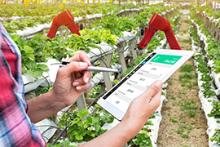Home > Our work > Innovation and commercialisation > Innovation and commercialisation
GPAI is transforming: further to the announcement of an integrated partnership with the OECD, this website will no longer be updated.
See here for more information
|
Innovation and commercialisation |
Blogs |
Working Group on Innovation and Commercialisation
The Innovation and Commercialisation (I&C) Working Group’s mandate is to:
- study and recommend tools and methods to drive international collaboration on AI R&D and innovation,
- advance research results into products and processes,
- transfer these results to industry, with a special focus on SMEs.
It will examine support measures to facilitate these advances, including standards and norms, self-certifications and more.
Current projects
The Working Group on Innovation and Commercialization is pursuing the following projects:
GPAI expert reports
2024
 Report on GPAI Sustainable Agriculture Convening
Report on GPAI Sustainable Agriculture Convening
On 3 April 2024, the Ministry of Electronics and Information Technology (MeitY) India held a virtual meeting convening GPAI members, experts, global and national stakeholders from the AI and agricultural community. Discussions centred around the challenges faced by smallholder farmers in Global South countries, existing and potential AI-driven solutions that can address these and the need for collaborative efforts and international cooperation to make progress. This convening was part of a series of initiatives planned by India, as lead GPAI Chair, and served as the precursor for other events and activities in the GPAI calendar, as well as towards the GPAI Innovation Workshop, Paris (22-23 May 2024).
2023
 Working Group Report (November 2023)
Working Group Report (November 2023)
Whereas innovation drives AI development, AI has the potential to increase creativity, productivity, and, in turn, greater innovation. Despite its positive effects, this feedback loop requires close examination to ensure that AI remains inclusive and sustainable for all. The Innovation & Commercialisation Expert Working Group (I&C EWG) was established to provide private and public actors with practical tools to advance international collaboration and research in this area and, ultimately, strike a balance between regulating AI while refusing to sacrifice innovation.
 Broad Adoption of AI by SMEs in the Agriculture and Farming Sector: Overview of 2023 Activities and 2024 Outlook (November 2023)
Broad Adoption of AI by SMEs in the Agriculture and Farming Sector: Overview of 2023 Activities and 2024 Outlook (November 2023)
In needing to feed the rapidly expanding global population while reducing the amount of space required to do so, the agriculture and farming (A&F) sector faces increasing demands for reform. In line with the priorities of GPAI Members and the UN Sustainability Objectives, GPAI Experts collaborated with stakeholders from business and agriculture to ensure that AI achieves this while respecting local practices. It will share resources and recommendations on the GPAI “Agro Portal” (currently under construction) to allow a collaborative approach to this global issue.
 Boosting Innovation while Regulating AI: Overview of 2023 Activities and 2024 Outlook (November 2023)
Boosting Innovation while Regulating AI: Overview of 2023 Activities and 2024 Outlook (November 2023)
Although AI brings with it the opportunity to enhance innovation and productivity across all sectors, its ubiquity makes it challenging to regulate. Governments are considering the potential of legal and voluntary frameworks in ensuring that it continues to serve the public good. Inaugurated in 2021, this project provides recommendations through examining how stakeholders are currently navigating this question. This report highlights its evolution from a set of principles to concrete guidelines and impact measures.
 Broad Adoption of AI by SMEs: Overview of 2023 Activities and 2024 Outlook (November 2023)
Broad Adoption of AI by SMEs: Overview of 2023 Activities and 2024 Outlook (November 2023)
Now that AI is becoming a permanent feature of most businesses, it is becoming increasingly difficult for those with limited systems to keep up with competition. With restricted resources, knowledge and infrastructure, small and medium-sized enterprises (SMEs), non-profit organisations (NGOs) and government-funded institutions typically lack the AI maturity to do so. GPAI Experts have constructed an online portal (“AI4SME Portal”) for SMEs to access recommendations on how best to adopt and deploy AI. This report highlights the progress made in 2023.
 Fostering Contractual Pathways for Responsible AI Data and Model Sharing for Generative AI and Other AI Applications (November 2023)
Fostering Contractual Pathways for Responsible AI Data and Model Sharing for Generative AI and Other AI Applications (November 2023)
Due to a lack of standardised definitions, regulation and codes of conduct, organisations face challenges in sharing data responsibly. With the emergence of generative AI, this ambiguity poses a risk to transparency, intellectual property, and liability. This report presents the findings of workshops held to help stakeholders overcome these obstacles, pointing to the potential for standard contracts to advance AI safety. Following its success, the project will be extended in 2024 with plans to launch an AI Contract Terms Incubator to allow for greater practicality and impact.
2022
 Innovation & Commercialization Working Group Report (November 2022)
Innovation & Commercialization Working Group Report (November 2022)
 Broad Adoption of AI by SMEs in the Agriculture and Farming Sector (November 2022)
Broad Adoption of AI by SMEs in the Agriculture and Farming Sector (November 2022)
 Broad Adoption of AI by SMEs (November 2022)
Broad Adoption of AI by SMEs (November 2022)
 Intellectual Property Expert Guidelines for scraping or collecting publicly accessible data (November 2022)
Intellectual Property Expert Guidelines for scraping or collecting publicly accessible data (November 2022)
 Intellectual Property Expert preliminary report on data and AI model licensing (November 2022)
Intellectual Property Expert preliminary report on data and AI model licensing (November 2022)
 Intellectual Property Primer (November 2022)
Intellectual Property Primer (November 2022)
2021
 Innovation & Commercialization Working Group Report (November 2021)
Innovation & Commercialization Working Group Report (November 2021)
 Innovation & Commercialization Working Group SMEs Committee Report (November 2021)
Innovation & Commercialization Working Group SMEs Committee Report (November 2021)
 GPAI Intellectual Property (IP) Primer (November 2021)
GPAI Intellectual Property (IP) Primer (November 2021)
2020
 Innovation & Commercialization Working Group Report (November 2020)
Innovation & Commercialization Working Group Report (November 2020)
Our experts
Group contact point: GPAI Paris Centre of Expertise
Group participants
- Laurence Liew, AI Singapore (co-chair, Singapore)
- Françoise Soulié-Fogelman, Hub France IA (co-chair, France)
- Laurence Liew, AI Singapore (co-chair, Singapore)
- Françoise Soulié-Fogelman, Hub France IA (co-chair, France)
- Mausam, Yardi School of Artificial Intelligence (Yardi ScAI) at the Indian Institute of Technology (India)
- Nathanael Ackerman, AI4Belgium, SPF Stratégie et Appui (Belgium)
- Sergio Álvarez Teleña, SciTheWorld, Himitsu Tech (Spain)
- Laercio Aniceto Silva, Centers of Reference in Innovative Technologies (Brazil)
- Norberto Ferreira, Center for Research and Development in Telecommunications (Brazil)
- Naohiro Furukawa, ABEJA (Japan)
- Daniel Gillblad, AI Sweden (Sweden)
- Marko Grobelnik, Artificial Intelligence Lab, Jožef Stefan Institute (Slovenia)
- Ingo Hoffman, AI Hamburg; ADI Innovation AG (Germany)
- Tagui Ichikawa, Hitotsubashi University (Japan)
- Robert Kroplewski, Ministry of Digital Affairs for Information Society (Poland)
- Katya Lainé, TALKR.ai; numeum; Le Voice Lab (France)
- Mekyung Lee, Korea University (South Korea)
- Andreas Liebl, appliedAI (Germany)
- Ségolène Martin, Kantify (European Union)
- Inma Martínez, Independent Expert in industrial and societal digital transformation (Spain)
- Edward McDonnell, Applied AI (Ireland)
- Lucas Noldus, Noldus Information Technology BV, Wageningen (Netherlands)
- Katarzyna Nosalska, Chancellery of the Prime Minister (Poland)
- Tom Peter Migun Ogada, T$P Innovation And Technology Management Services Ltd. (Kenya)
- Vili Podgorelec, Intelligent Systems Laboratory at the University of Maribor (Slovenia)
- Golestan “Sally” Radwan, Egyptian Minister for Artificial Intelligence (Egypt)
- Alžběta Solarczyk Krausová, Institute of State and Law of the Czech Academy of Sciences (Czech Republic)
- Lee Tiedrich, Duke University (United States)
- Junichi Tsujii, Japan's National Institute for Advanced Industrial Science and Technology (Japan)
Observers
- Flavio Calvino, OECD
- Yann Dietrich, Atos (France)
Specialists
- Vikram Adve, AIFARMS National AI Institute, University of Illinois at Urbana-Champaign (United States)
- Carolyn Blankenship, Thomson Reuters (United States)
- Cyrus Hodes, AgTech-Climate Tech Founder (France/United States)
- Noriyuki Murakami, Research Center for Agricultural Information Technology; Research Center for Agricultural Robotics (Japan)
- Daniela Rus, MIT (United States)
- Hisao Shiomi, Tsukuba University (Japan)
- Marc-André Sirard, Université Laval (Canada)
- Rajesh Sreenivasan, Rajah & Tann Cybersecurity, Rajah & Tann Technologies, Rajah & Tann Asia (Singapore)
- Ulrike Till, WIPO (Germany/Switzerland)






